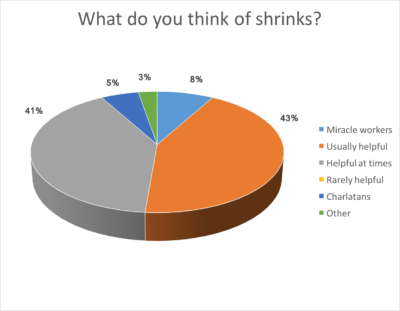On August 7 I asked, what do you think of shrinks? Totally unscientific, probably the wrong question, and interesting as hell anyway. Unsurprisingly, the answer comes down to, “it depends.” But it raises another, more important question: how do you go about finding the right shrink?
The results
Most people – 92% – thought they are at least sometimes helpful, and a slim majority thought they are usually helpful or downright miracle workers. On the other end of the scale, 5% thought they are charlatans. Frankly, I thought the charlatan end of the scale would be higher.
The comments were very interesting. Those who made positive comment were either helped directly, or had seen a family member helped, by good mental health care. They’d been helped through a period of grief, or through conflict, or toward better relationships. One said she thought everyone should see a mental health practitioner (MHP) – a more PC term for “shrink” – at some point in their life.
Others pointed out shortcomings. One told the story of a MHP who said, to her face,“well you are rather odd.” Sigh. Let’s just say that’s not part of Bedside Manner 101.
A colleague of mine wrote that we psychologists often “take ourselves too seriously and [are] prone to over-analysis.” Amen to that.
One really important criticism came from a commenter who wrote that “normalcy” can be a constricting term, and mental health care can be used as a social control. This one needs another post of its own, because it’s really important to understand that mental health care takes place in a social context. My professional brethren don’t always understand that without a social conscience, psychotherapy is at best less than it can be, and at worst causes outright harm. More to come.
One size doesn’t fit all
A couple of people pointed out that it’s just not possible to answer a blanket question about MHPs. As one colleague and friend wrote, it’s “kinda like asking what you think of Methodists.” Another commenter noted that most people don’t understand the differences between psychiatrists, psychologists, social workers, counselors, coaches. A lot of people said some version of “it depends.”
Exactly what it depends on is an interesting question in itself. Here’s a list the comments brought out:
- Diagnosis – different MHPs are better at working with some conditions than others.
- Expectations – MHPs don’t have a magic pill for everything (another topic for yet another post).
- Desire – the client has to want help, and the MHP has to want to help.
- Skill – some MHPs are simply better than others. Some engage better, and some know more about evidence regarding what does, and doesn’t, work.
- Trust, and the relationship – by far the most common comment was some version of “you have to find the right person.”
It strikes me that none of these characteristics is sufficient, though all might be necessary. To me it comes down to the question of “fit.” Matching temperaments, skills, expectations, and the ability to connect are the keys to whether a MHP will help, or not.
Emotional Sherpas
One of my favorite comments was this:
I think of them as Emotional Sherpas. We all have history. We all have issues. Shrinks just help us understand and navigate these pitfalls in life. I also think that it is very, very, very, very … did I say VERY important to find the shrink that fits your needs. They are all different. They have different ways of going on about treatment. Some can do damage with their methods and this is a waste of energy, time, and money. Do the research and find the right Sherpa Shrink for yourself.”
Sherpas are an ethnic group from around Nepal. They help climbers reach Himalayan peaks, because of their expert knowledge of the terrain. I think that’s exactly the right image. It’s the right image for the potential client, because it points out that you’re looking for someone who knows the territory, and you’re looking for someone you can trust. Maybe with your life.
It’s also the right image for me as a psychologist. I am not the one who needs to summit the mountain; my job is to help you summit. I am not the one who should get the glory; you are.
I am not there to tell you which mountain to climb, and my job is not to be smarter, faster, or better than you. If I’m doing my job well, I’m there to help you climb the mountain of your choosing, and helping you get smarter, faster, and better than you currently feel.
That’s as good an image for finding the right shrink as I’ve ever seen: The Emotional Sherpa.
Stay tuned
Next up in Part 2, how to interview your potential emotional Sherpa, and determine if s/he is the right one for you. Check back the first of next week.
Dr. Les Kertay




